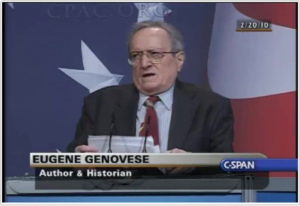Eugene D. Genovese (1930-2012) ranks as one of the most influential historians and public intellectuals of his generation. As Le Moyne College Professor of History Douglas R. Egerton, long-time friend of The Alexander Hamilton Institute for the Study of Western Civilization (AHI), recently stated, “No historian played a larger role” than Genovese “in recovering the complicated, turbulent world of antebellum cotton slavery.” Many scholars regard Genovese’s Roll, Jordan Roll: The World the Slaves Made (1974) to be the most profound study of slavery in the Old South ever written. The book has made multiple lists of the 100 most important works of non-fiction of the twentieth century.
Genovese mentored Douglas Ambrose and Robert Paquette, two of AHI’s three Charter Fellows, and served as a charter member of its advisory board. Genovese bequeathed to AHI his library on southern history and several boxes of his professional correspondence. To honor Genovese and preserve his legacy, AHI has taken on several projects. In the weeks ahead, it will announce the completion of a catalog of the bequeathed books (more than 3000 titles) and correspondence. This week Cambridge University Press announced the completion of a second project: the publication by Douglas Ambrose of Genovese’s unfinished manuscript The Sweetness of Life: Southern Planters at Home.
The volume has garnered advance praise from prominent historians. Iowa State University history professor Kathleen Hilliard called it a “subtly provocative work,” in which “Genovese pulls back the curtain on the lives of leisure [of southern] planters”; she found it “a fitting coda to a corpus of immeasurable impact.” Professor Egerton described the book as a “brilliant and insightful study,” which “serves as a capstone to Genovese’s fifty years of distinguished scholarship.” He credited Ambrose with an outstanding job of editing in preparing the manuscript for publication. Orville Vernon Burton, Clemson University Professor of History and author of The Age of Lincoln, found the volume “sparkling with insight and humanity.” It continues Genovese’s examination of the slaveholder class, “describing in detail the essential ways in which it created its own definition of hospitality, of manners, of leisure, and more as it rushed toward civil war. . . . [Genovese’s] writing is engaging and crystal clear, and the scholarship rich. The academy owes Genovese’s devoted student, Douglas Ambrose, a debt of gratitude for shepherding this sweet, final bit of Genovese’s oeuvre to publication. It is well worth the read.”
 In 2000, Paquette co-edited a festschrift for Genovese, Slavery, Secession, and Southern History, which included an interview of him, widely cited by scholars. “Eugene Genovese,” said Paquette, “had a decisive impact on my scholarly career. He was a demanding mentor with an extraordinary intellectual trajectory that took him from Marxist atheism to observant Roman Catholicism. At no point along the way, did he permit his political commitments to taint his professional obligations. He stood for the highest standards; the AHI could not have had a more fitting academic adviser. Doug Ambrose’s labor of love will enrich all serious students of American history.”
In 2000, Paquette co-edited a festschrift for Genovese, Slavery, Secession, and Southern History, which included an interview of him, widely cited by scholars. “Eugene Genovese,” said Paquette, “had a decisive impact on my scholarly career. He was a demanding mentor with an extraordinary intellectual trajectory that took him from Marxist atheism to observant Roman Catholicism. At no point along the way, did he permit his political commitments to taint his professional obligations. He stood for the highest standards; the AHI could not have had a more fitting academic adviser. Doug Ambrose’s labor of love will enrich all serious students of American history.”
Eugene Genovese (Copyright CSPAN)
In the epilogue of Sweetness of Life, Ambrose reflected on Genovese the man and the historian. He “understood the difference between explanation and dogma.” He discovered “how engaging the past as a professional historian to the best of his ability fulfilled both his personal desire for a meaningful life and his political, indeed moral, commitment to contributing to a better world.” Genovese “sought, above all, to contribute to the collective project of historical understanding, convinced that such understanding enriched us as human beings, contributed to the common good, and helped the best of political people avoid the grossest of errors.”
By Mary Grabar, AHI Resident Fellow


Leave A Comment